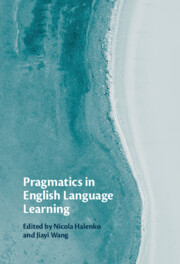Introduction
Published online by Cambridge University Press: 29 September 2022
Summary
Written by an international team of experts, this groundbreaking book explores the benefits and challenges of developing pragmatic competence in English as a target language, inside and outside the classroom, and among young and adult learners of English. The chapters present a range of first language (L1) contexts, including China, Germany, Indonesia, Italy, Mexico, and Norway, to provide international perspectives on how different L1s present varying challenges for developing pragmatic awareness in English. The book outlines cutting-edge techniques for investigating spoken and written pragmatic competence, and offers both face-to-face and online practical teaching solutions. It also examines underexplored areas of second language (L2) pragmatics research, such as young learner groups, the effects of textbook materials, study abroad contexts, and technology-mediated instruction and assessment. Innovative and comprehensive, this volume is a unique contribution to the field of L2 pragmatics, and will be essential reading for researchers, course developers, language teachers, and students.
- Type
- Chapter
- Information
- Pragmatics in English Language Learning , pp. 1 - 6Publisher: Cambridge University PressPrint publication year: 2022



